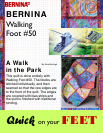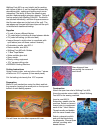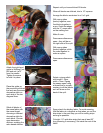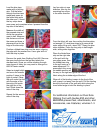
Draw diagonal lines
connecting the corners of
each block.
Construction
Attach the open-toe sole to Walking Foot #50;
this sole provides extra visibility. Attach Walking
Foot #50 to the sewing machine.
Insert a new #90/14
Embroidery needle into the
machine. Select an Isacord
thread color to complement
each of the 7 block fabrics.
Thread needle and bobbin
with the same thread color.
Select a decorative stitch
and quilt the block along
the diagonals. Choose open
stitches, avoiding satin-
based stitches.
Walking Foot #50 is a very helpful aid for working
with layers of fabric. It can be used with almost any
decorative stitch, making grid quilting much more
interesting! The ability to move the needle to any
position makes precision piecing a breeze. This quilt
is done entirely with Walking Foot #50. The blocks
are stitched individually, and then they are seam so
that the raw edges are to the front of the quilt. The
raw edges are covered with bias strips and the quilt
is finished with traditional binding.
Supplies
• ⅔ yard of seven different fabrics
• 1¼ yards fabric for binding & strips between blocks
• 2¼ yards loft batting (or twin size batt)
• Isacord thread in eight colors to coordinate with
quilt fabrics (can use fewer colors if desired)
• Embroidery needle, size 90/14
• Denim needle, size 90/14
• Walking Foot #50 with Guides
• 1” Bias Tape Maker
• Water-soluble glue stick
• Spray starch
• Rotary cutting equipment
• 12½” square quilting ruler
• BERNINA Sewing Machine
Cutting Instructions
Using a rotary cutter, mat and ruler cut the 7 pieces
of fabric into 10¾” squares (8 from each piece).
Cut the batting into twenty-five 10¾” squares.
Preparation
Make 25 quilt sandwiches using the fabric and bat-
ting squares, layering the same print on the top and
bottom of each batting square.
You will have six extra fabric squares left over.






